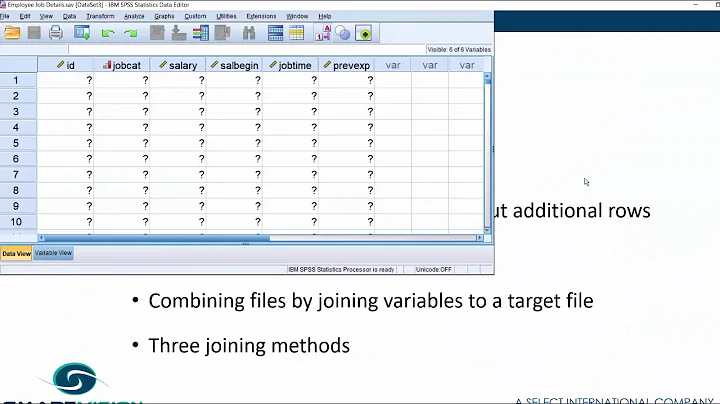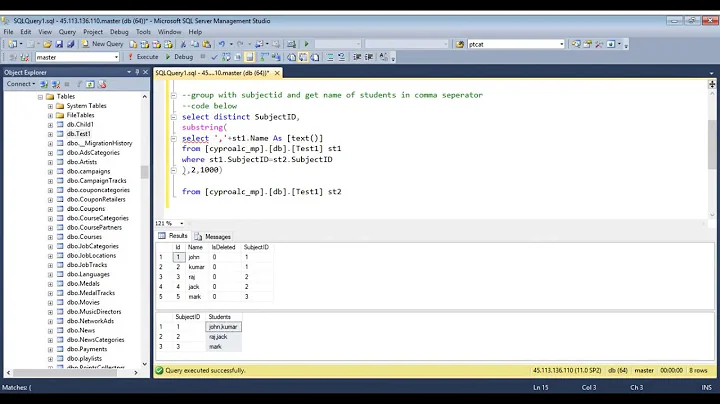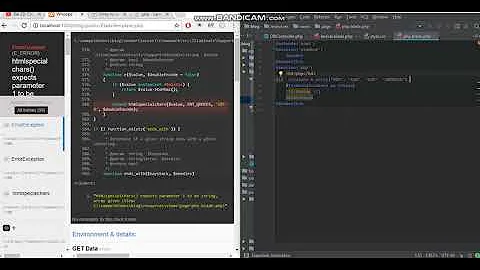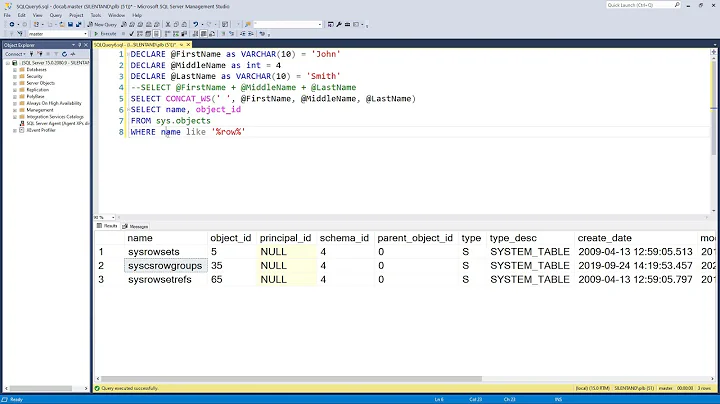Combine multiple error strings
Solution 1
You could use the strings.Join() and append() function to acheive this slice.
package main
import (
"fmt"
"strings"
"syscall"
)
func main() {
// create a slice for the errors
var errstrings []string
// first error
err1 := fmt.Errorf("First error:server error")
errstrings = append(errstrings, err1.Error())
// do something
err2 := fmt.Errorf("Second error:%s", syscall.ENOPKG.Error())
errstrings = append(errstrings, err2.Error())
// do something else
err3 := fmt.Errorf("Third error:%s", syscall.ENOTCONN.Error())
errstrings = append(errstrings, err3.Error())
// combine and print all the error
fmt.Println(fmt.Errorf(strings.Join(errstrings, "\n")))
}
This would output a single string which you can send back to the client.
First error:server1
Second error:Package not installed
Third error:Socket is not connected
hope this helps!
Solution 2
UPDATE for Go 1.13:
As of Go version 1.13, the language's errors package now supports error wrapping directly.
You can wrap an error by using the %w verb in fmt.Errorf:
err := errors.New("Original error")
err = fmt.Errorf("%w; Second error", err)
Use Unwrap to remove the last error added, and return what remains: previousErrors := errors.Unwrap(err)
Playground Example for errors.Unwrap
Two more functions, errors.Is and errors.As provide ways to check for and retrieve a specific type of error.
Playground Example for errors.As and errors.Is
Dave Cheney's excellent errors package (https://github.com/pkg/errors) include a Wrap function for this purpose:
package main
import "fmt"
import "github.com/pkg/errors"
func main() {
err := errors.New("error")
err = errors.Wrap(err, "open failed")
err = errors.Wrap(err, "read config failed")
fmt.Println(err) // "read config failed: open failed: error"
}
This also allows additional functionality, such as unpacking the cause of the error:
package main
import "fmt"
import "github.com/pkg/errors"
func main() {
err := errors.New("original error")
err = errors.Wrap(err, "now this")
fmt.Println(errors.Cause(err)) // "original error"
}
As well as the option to output a stack trace when specifying fmt.Printf("%+v\n", err).
You can find additional information about the package on his blog: here and here.
Solution 3
String functions don't work on errors because error is really an interface that implements the function Error() string.
You can use string functions on err1.Error() and err2.Error() but not on the "err1" reference itself.
Some errors are structs, like the ones you get from database drivers.
So there's no natural way to use string functions on errors since they may not actually be strings underneath.
As for combining two errors:
Easy, just use fmt.Errorf again.
fmt.Errorf("Combined error: %v %v", err1, err2)
Alternatively:
errors.New(err1.Error() + err2.Error())
Solution 4
To expand on what @WillC had mentioned in a comment it is possible to define your own error type as error is an interface type. Any type that implements a Error() string function implements the error interface. Therefore, you could create a CollectionError which aggregates errors and returns a concatenated error string.
type ErrorCollector []error
func (c *ErrorCollector) Collect(e error) { *c = append(*c, e) }
func (c *ErrorCollector) Error() (err string) {
err = "Collected errors:\n"
for i, e := range *c {
err += fmt.Sprintf("\tError %d: %s\n", i, e.Error())
}
return err
}
This provides a collection function that appends a given error to a slice. Upon calling Error() string it iterates over the slice and creates a concatenated error string.
func main() {
collector := new(ErrorCollector)
for i := 0; i < 10; i++ {
collector.Collect(errors.New(fmt.Sprintf("%d Error", i)))
}
fmt.Println(collector)
}
There is a great golang.org blog post going over errors in more detail. A full example of the example is available on The Go Playground.
Solution 5
People may be interested in https://github.com/hashicorp/go-multierror which describes itself as "A Go (golang) package for representing a list of errors as a single error.".
Related videos on Youtube
Greg Petr
Updated on July 09, 2022Comments
-
Greg Petr almost 2 years
I am new to golang, my application needs to return multiple errors in a loop, later requires to be combined and returned as a single error string. I am not able to use the string functions to combine the error messages. What methods can be use to combine these errors into a single error before returning ?
package main import ( "fmt" "strings" ) func Servreturn() (err error) { err1 = fmt.Errorf("Something else occured") err2 = fmt.Errorf("Something else occured again") // concatenate both the error return err3 }-
ZAky over 8 yearsNot enought information. What the client do? What your server do? A sample output.
-
-
Greg Petr over 8 yearsAny other ways other than using fmt.Errorf(), why cant I use the string function ?
-
kostix over 8 yearsSure. Depends on what you really mean by "combining". String concatenation is done using the
+operator. Or you might store them individually in a slice,append()-ing values to it. This question suggests you should work yourself through a Go tutorial and get a book on it. -
Will C over 8 years@GregPetr Potentially another clean way to do this is to have your own
CombinedErrorstruct that takes a list of errors as a field and implements theError() stringmethod and do what you want, whether its concatenating strings or whatsoever. -
Greg Petr over 8 yearsthanks, your example was very useful. I will try this out and get back.
-
 Rakesh about 6 years@BenCampbell Is there a reason for the method receiver to be a pointer here?
Rakesh about 6 years@BenCampbell Is there a reason for the method receiver to be a pointer here? -
 David about 6 yearsThanks for this tip. On the off chance one might add a nil error, the Error() function should do a nil check on the collected errors. And if one accesses by just index and not index + value, need to deference cast the error array before the index access. Here's an example: play.golang.org/p/h9F5WhcQ5Bs
David about 6 yearsThanks for this tip. On the off chance one might add a nil error, the Error() function should do a nil check on the collected errors. And if one accesses by just index and not index + value, need to deference cast the error array before the index access. Here's an example: play.golang.org/p/h9F5WhcQ5Bs -
dolmen about 4 yearsWrapping is not for a multiple errors. It is for wrapping ONE error with more context.
-
dolmen about 4 years@Rakesh No.
func (c *ErrorCollector) Error() (err string)should befunc (c ErrorCollector) Error() (err string). -
 John Isaac over 2 yearsYou don’t need to, but it would violate convention to have some methods be pointer receivers and some to be value receivers. Collect needs to be a pointer receiver.
John Isaac over 2 yearsYou don’t need to, but it would violate convention to have some methods be pointer receivers and some to be value receivers. Collect needs to be a pointer receiver. -
Paulo Neves over 2 years@dolmen can you provide a citation on that assertion?
-
dolmen over 2 years@PauloNeves So far 17 persons approved my comment.
-
Paulo Neves over 2 years@dolmen what is that supposed to mean?
-
igorushi over 2 yearspay attention that if first error is nil e.g [nil, error1, error2, error3] you code will return nil because of the Wrap implementation ``` func Wrap(err error, message string) error { if err == nil { return nil } err = &withMessage{ cause: err, msg: message, } return &withStack{ err, callers(), } } ```
-
Sebastian over 2 yearsGood point. This assumes that errs passed to the function are not nil.
-
Devin Burke over 2 years@Paulo: @dolmen is asserting that error wrapping is most intuitive when used like
InnerExceptions in other languages. a wrapped error is not a list of (sibling) errors, but a chain of (parent-child) errors. there's nothing that stops you from using it like a list, but IMO it is counterintuitive. -
dolmen almost 2 yearsIf you agree with my statement, please downvote this answer to help bubble up more useful answers.














